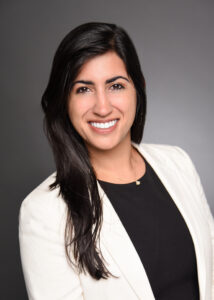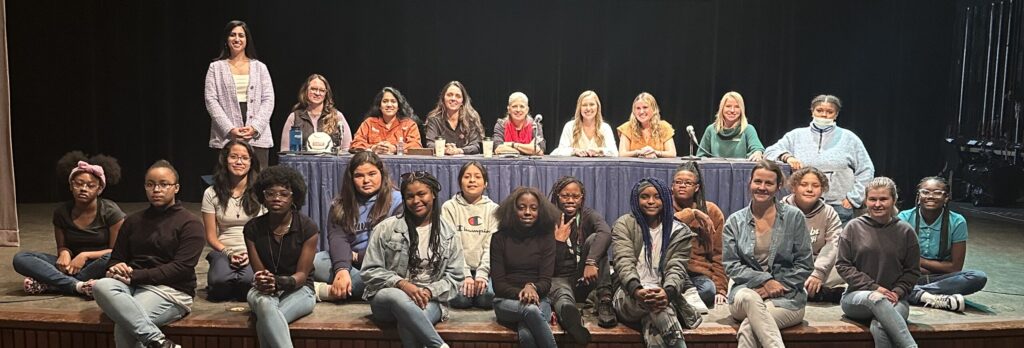Mahsa Poorak believes with all her heart that we HAVE to change the message. As a former public defender turned electrical contracting company chief operating officer, she brings a unique perspective to Southern Electric Company (SEC), Alpharetta, GA.
“I feel like there is this idea that one size fits all — that college is the only path to meaningful work,” Mahsa says. “The math is just not there for college as the only answer.”
The need to change that message became crystal clear to Mahsa when running the family business became her responsibility after her father Jalil’s passing in 2018. She gained an amazing company built by the sweat, determination, and over-the-top hard work of her father. She also found a shortage of able workers prepared and ready as a stumbling block to keeping the company moving forward as her father intended.
She needed to get Southern Electric Company back on solid ground in the short term and she wanted to build the workforce for the long term — for her company and for others.
Mahsa got busy.
Reestablishing Southern Electric
With her father’s death, Mahsa’s mother Sima took ownership of the company and her younger sister Parisa works as a company secretary. The Poorak family strives to maintain Jalil Poorak’s legacy and the reputation and success of SEC.
For a year-plus Mahsa attempted to run SEC from California while continuing her much-loved role as public defender in Alameda County. She’d often begin her days at 5:00 a.m. with SEC conference calls, talk with SEC accountants at lunchtime, and do more SEC business at night.
“After a year of doing that, I knew it wasn’t sustainable,” Mahsa says. “The interim president had come out of retirement for us and we always knew it would be a temporary role and not a long-term solution for the company. I also knew that if I didn’t come home and do this, I would never get an opportunity to run a company like this ever again. I decided to take it and run with it.”
She moved back to Georgia, took the Georgia bar exam in 2020, and began her management role at SEC about a week before the first COVID-19 shutdown.

“It was really a strange time to be coming into construction generally and any type of management position because there was so much uncharted territory,” she says.
SEC had a backlog of work that kept the company with a consistent revenue stream during COVID, but they were short on new projects for the future. Mahsa went to work to rebuild relationships with general contractors in the Atlanta area that had floundered. She put herself out there, joined the Associated General Contractors of Georgia Young Leadership Program, met and nurtured contacts made there, and built trust in her and her company every step of the way. Hearing Nancy Juneau, CEO of Juneau Construction Company, speak on an AGC panel was a game-changer for Mahsa.
“She was amazing and when she was done speaking, I ran across the room to give her my card and asked her if I could go to lunch with her sometime,” Mahsa remembers. “I told her ‘I just want to learn from you!’ We met for that meal and spent a few hours together.”
A bit later, that time spent with Nancy earned SEC the opportunity to bid on a student housing project at Emory University (Mahsa’s alma mater). SEC won it, and it remains the company’s single biggest job ever.
“She chose to give us a chance,” Mahsa says. “Nancy did not give the job to us; we had to earn it. I am thankful for that; it is how I like to do business.”
Changing the Message
Feeling a bit better about business in hand at SEC, Mahsa went on to her workforce development goals. She says the trades are not presented in schools as a reputable profession anymore and she feels that’s an abhorrent problem.
“The only thing that’s talked about is college,” Mahsa says. “Consider the fact that student loan debt is out of control and most graduate college with no work experience. For tradespeople, it’s very different. You spend four years in apprenticeship programs that your employer is not only paying for the program but they’re paying you to work full-time and giving you benefits. By the time you graduate from the apprentice program, you have four years of work experience, four years of financial gain, and four years of benefits. This is information that needs to get out there.”
Mahsa adds that not only are the trades not promoted in middle and high schools but the Technical College System of Georgia (TCSG) is not supporting development of these skills on their campuses and offers limited funding for the few outside organizations like the IEC that offer this type of training. Even more exasperating to Mahsa is that while TCSG accredits the IEC apprenticeship program, state Hope Scholarship assistance is not available to academically strong students who opt to go into the trades.
“So, a lot of students choose to go to college because the Hope Scholarship legitimizes that path,” Mahsa says. “But the same is not offered to IEC apprentices.”
This is a fundamental problem for electrical contractors, and Mahsa is taking steps to tackle this disconnect in a number of ways. Through her affiliation with IEC of Atlanta, Mahsa was asked to speak at a small business committee at the Georgia capitol to shed light on the kinds of challenges that business owners are facing. There she met House Representative Leesa Hagan, who introduced her to a Vidalia County effort called This Girl Can.
“An incredible woman named Paige Williamson through the Toombs County Family Connection created a partnership with Southeastern Technical College for middle school girls to increase awareness of and interest in non-traditional careers for females,” Mahsa explains. “I had the chance to participate with other women on a panel for This Girl Can. We spoke for an hour and a half, answered the girls’ questions, and saw firsthand that the trades are not talked about in schools as the girls were unaware of their options.”
Mahsa notes she spent a few minutes with a girl whose interest was in drawing and she had dreams of going to the Savannah College of Art and Design. Mahsa opened her eyes to drawing being important in construction as well, showing her alternatives.
Representative Hagan also has connected Mahsa to the Georgia commissioner for TCSG, who so far has passed Mahsa along to a business development person. Mahsa also has reached out to the Georgia Commissioner of Labor Bruce Thompson who has agreed to meet. Georgia Governor Brian Kemp and Atlanta Mayor Andre Dickens so far have not agreed to meet with her.
“My opinion is that the trades are not viewed as a legitimate path for students,” says Mahsa in explanation for the lack of response from legislators.
That’s why Mahsa is putting great effort into initiatives like This Girl Can and the Crew Collaborative, a nonprofit organization using innovativetactics to strengthen the blue-collar workforce, establish community around the world, and change the stigma surrounding careers in construction through education, conversation, events, and advocacy.
“Crew Collaborative is a national group, and every month they put on a panel over Zoom that goes directly into middle school and high school classrooms where trade professionals talk about their career paths, the work they do, the good and bad, and provide a salary range,” Mahsa shares. “It’s incumbent upon people like me in our industry to go out and spread the word to that next generation.”
Mahsa hopes to explore with the mayor and the governor building This Girl Can and Crew Collaborative type programs throughout the state of Georgia.
“Governor Brian Kemp has a construction background, so he should have a unique insight into this need,” Mahsa says. “He has a very high approval rating in the state of Georgia so I think if he were to come out and say that education is not just college — that there are other roads to great careers — it would have great impact.”
Mahsa says Georgia has a booming economy with numerous big dollar construction projects in the wings for years to come.
“We have an incentive to develop our workforce because we need people who are not only going to build these new facilities but those who are going to work on and maintain them after they are built,” Mahsa says. “I’ll keep being very loud about it until I’m heard!”
Retention at SEC
While leading efforts to develop the workforce at SEC and change the message about trades, Mahsa knows she also has to keep things running smoothly at Southern Electric. The way to do that, she believes, is not some manufactured five-step program to increase employee retention.
“The way to create a good company culture and have your employees stay is to actually care about your employees and do things for them,” Mahsa says.
She believes you need to be transparent about how the company is doing, be clear about your promotion and bonus plans, and make decisions in the spirit of how you can pour back into the people who are doing to work that allows you to have a company in the first place.
“For some reason I don’t understand, average health insurance costs go up between 15 to 18 percent every year,” she says. “That’s insane. For each of my employees that might mean an additional $60 to $100 coming out of their pay each week. My people can’t afford that, so the decision was made that the company was going to consume most of that cost this year.”
Mahsa has an open-door policy and tries to help employees through challenges they may be facing, like when she found an excellent attorney to work pro bono for an employee who was facing some specific immigration questions.
“At the end of the day, it will make me money to take care of my staff,” Mahsa concludes. “Maybe it’ll make me slightly less money than it would have if I had nickeled and dimed everybody but would I be better off that way? I don’t think so. Would my staff be better off that way? Absolutely not.”

